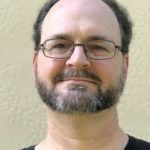We are delighted to announce the results of the recent 2023 P4 Technical Steering Team (TST) Elections. Andy Fingerhut (Intel) and Fabian Ruffy (NYU/Intel/Barefoot) have been elected to 2-year terms on the P4 TST.
We also would like to extend a warm thank you to outgoing TST member Robert Soulé (Yale). Your hard work and dedication is greatly appreciated!
The P4 ecosystem is growing stronger as P4 finds its way into commercial offerings and serves as the foundation for all of ONF’s Programmable Network projects. To see how broadly P4 is being adopted, check out the wide array of products, project and services that leverage P4.
P4 community momentum also continues to accelerate, with P4 code contributions increasing by 69% in 2022. The P4 working groups continue to make significant progress and release regular specification updates, along with increased opportunities for community engagement via tutorials and hackathons. Get involved today!
About Our New P4 TST Members
Andy Fingerhut
 Andy Fingerhut has three decades of experience in the computer networking industry, working primarily on hardware and low level control software for large scale switch fabrics, network processors, and intrusion detection techniques. He has served as the co-chair of the P4.org architecture working group since 2018. He is a Principal Engineer at Intel Corporation working on programmable switches and NICs, enabling new data plane features and how to expose them in the P4 programming language.
Andy Fingerhut has three decades of experience in the computer networking industry, working primarily on hardware and low level control software for large scale switch fabrics, network processors, and intrusion detection techniques. He has served as the co-chair of the P4.org architecture working group since 2018. He is a Principal Engineer at Intel Corporation working on programmable switches and NICs, enabling new data plane features and how to expose them in the P4 programming language.
Andy and his co-chair Calin Cascaval wrote well over half of P4’s Portable Switch Architecture specification after much discussion with, and help from, the working group members. He hasn’t kept count, but has probably created over a hundred issues over the years in the open source P4 code repositories on GitHub. Some have been just questions, but often also bugs or clarifications in the language specification or its open source compiler and other related tools.
Andy holds a Doctorate Degree in Computer Science from Washington University, advised by Jonathan Turner whose research interests include the design and analysis of high performance routers and switching systems, extensible communication networks via overlay networks, and probabilistic performance of heuristic algorithms for NP-complete problems. Jonathan’s work inspired Andy’s interest in computer networking.
“The P4 working groups have provided me with an opportunity to learn from and collaborate with the brightest minds in the computer networking area.”
Fabian Ruffy
 Fabian is a PhD candidate in the systems lab of New York University (NYU) advised by Anirudh Sivaraman. He has been contributing to the P4 project since 2018 and he has published several papers promoting the value of the P4 language at OSDI, HotCloud, HotNets, the P4 workshop, and Linux Plumbers. He is also a regular attendee of the P4 language design working group.
Fabian is a PhD candidate in the systems lab of New York University (NYU) advised by Anirudh Sivaraman. He has been contributing to the P4 project since 2018 and he has published several papers promoting the value of the P4 language at OSDI, HotCloud, HotNets, the P4 workshop, and Linux Plumbers. He is also a regular attendee of the P4 language design working group.
Fabian is most active on the official P4 compiler repository. Torturing the compiler and associated software with automated validation tools, he has filed well over a hundred bug reports. Since 2021 he has also been part of Intel’s P4 compilers and tools team. Fabian is currently working on a test oracle that can produce input-output tests for any P4 target architecture.
As a member of the P4 TST, Fabian wants to reduce the barriers of adoption of p4.org projects. He intends to promote p4 language tooling, making the day-to-day work of P4 developers easier. This includes introducing support for language servers, auto-completion, syntactical highlighting, and general static analysis. Furthermore, Fabian wants to support projects that reduce the friction of installing and using P4lang projects. This involves the development of appropriate packaging, documentation, versioning, and testing.
About P4
The P4 Open Source Programming Language is governed by the Technical Steering Team, Chief Architect, Advisory Board, and the ONF Board of Directors. Governance of the P4 project fosters openness and technical meritocracy. ONF provides additional stewardship and engineering resources to host and support the P4 Project. Learn more about P4